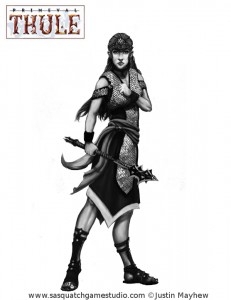There are myriad gods in Thule: Protectors of cities, patrons of merchants, spirits of forests or beasts, and dark things remembered only by a few savage tribes or vile cults. This is a superstitious age, and humankind is surrounded by mysterious powers. In such a world, people naturally seek to understand the forces around them by giving them names and seeking to win their favor or avert their displeasure. Whether the gods take note of such things or not, few indeed could say, for the gods of Thule are inscrutable.
The Eleven Powers
While much might be said of the beast-spirits or forest-demons that rule the savage tribes of the wilderness, most civilized Thuleans recognize a distinct pantheon of greater powers with wide influence and temples in the more important city-states. This group of major deities is sometimes known as the Eleven Powers. Not all of the Eleven are known in all cities; different priesthoods wield different amounts of influence from city to city. In fact, many Thuleans would argue about which deities are properly numbered among the Eleven Powers, usually substituting a civic patron, a legendary hero, or (in some cases) an anthropomorphized version of one of the Great Old Ones.
The Eleven Powers are generally held to include:
- Asura – NG, Goddess of dawn, fire (Fire, Glory, Good, Liberation)
- Inar – N, God of the woods and the hunt (Animal, Plant, Strength, Travel)
- Hanuman – CG, God of trickery, skill, heroes (Artifice, Protection, Travel, Trickery)
- Ishtar – CN, Goddess of love and luck (Charm, Community, Knowledge, Trickery)
- Kishar – N, Goddess of the earth, agriculture (Community, Earth, Healing, Plant)
- Mithra – LG, God of sun, sky, lordship (Law, Nobility, Protection, Sun)
- Nergal – NE, God of war, the underworld (Death, Earth, Evil, War)
- Selene – LN, Goddess of the moon, fate (Healing, Luck, Magic, Repose)
- Set – LE, God of night, secrets, snakes (Darkness, Evil, Knowledge, Scalykind)
- Tarhun – CN, God of storms and battle (Air, Strength, War, Weather)
- Tiamat – CE, Goddess of the sea, chaos (Chaos, Destruction, Water, Weather)
The gods have little to do with mortal souls or the afterlife, and most city-dwellers are not terribly religious; the idea of seeking eternal salvation through faithful service to a deity simply isn’t a part of most cultures. Instead, pious citizens observe rituals and make minor sacrifices more as a matter of participating in civic culture (and perhaps invoking a little good luck) than as a matter of seeking favor in the hereafter.
Priests and Power
 In many fantasy settings, the gods are very active and signs of their work are all around, but the gods of Thule are more secretive or aloof than those of other worlds. This is not a world where gods move mortals like chess pieces or appear in shining visions to direct their followers to take on quests or launch crusades. A cleric in Thule is generally left to his own devices, and determines the nature of his service on his own.
In many fantasy settings, the gods are very active and signs of their work are all around, but the gods of Thule are more secretive or aloof than those of other worlds. This is not a world where gods move mortals like chess pieces or appear in shining visions to direct their followers to take on quests or launch crusades. A cleric in Thule is generally left to his own devices, and determines the nature of his service on his own.
Clerical magic is rarely seen, and is every bit as secretive and mysterious as arcane magic. In Thule, clerics don’t pray to their deities for spells or channel energy from some extraplanar divine battery. Instead, they gain their magical powers when they are initiated into the deeper mysteries of their chosen deity’s worship. To put it another way, once a priestess of Ishtar is initiated into the secrets of Ishtar’s priesthood and invested with power, she gains the ability to use the spells you’d expect her to have. A secret ritual confers the ability to use Ishtar’s magic on the new initiate, rather like a permanent version of an imbue with spell ability spell that grows in strength with its recipient. What she does with those powers after that point is up to her.
Because clerics can only be judged by the observable actions they take, it is far from certain that any given cleric is serving his or her deity faithfully. Priests, like all other mortals, are fallible and corruptible, and their magic has no special divine imprimatur that makes it holy or good. Magic in a sword-and-sorcery setting should be mysterious, and Thule’s priesthoods are nothing if not mysterious.
The Other Gods
The Eleven Powers are the gods of Thule, but they are not the only gods in Thule. Long before the gods of the human pantheon came into existence and assumed their places, primordial powers—evil, ancient, unhuman—came to the young planet and established their alien dominion over land, sky, and sea. Driven into hibernation in the desolate places of the world or exiled to the far reaches of time and space, they hunger to return and reclaim what was once theirs. Some who bargain with these beings do so in search of power, some are degenerate tribes that cling to their monstrous gods, and some are vile cultists who pray for the end of all. Few indeed dare to name these Other Gods aloud, but that does not mean They are not worshipped.

